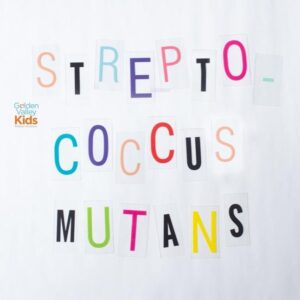 What is early childhood caries, or ECC? Well, caries is the medical term for cavities. So, this term means cavities in young children. Anyone can get a cavity, including young children and babies. Any child under the age of 6 who has a cavity or has had a filling or has lost a tooth has early childhood caries. Cavities are the most common chronic childhood illness … even more common than asthma!
What is early childhood caries, or ECC? Well, caries is the medical term for cavities. So, this term means cavities in young children. Anyone can get a cavity, including young children and babies. Any child under the age of 6 who has a cavity or has had a filling or has lost a tooth has early childhood caries. Cavities are the most common chronic childhood illness … even more common than asthma!
What causes early childhood caries? The short answer is bacteria and sugar (or diet). The bacteria that cause cavities are called Streptoccous mutans or S. mutans for short. The younger a child is when they are exposed to these bacteria, the more aggressive the bacteria are. Exposures can happen from sharing utensils or from kissing babies and young children on the lips. Most children become colonized with bacteria in their mouths by 10 months of age. Their bacterial species are most similar to those of the primary caregiver. S. mutans like to eat sugars and carbohydrates and then they produce acid with is what destroys the enamel of the teeth. Obviously, candies have a lot of sugar in them, but sugar is also found in beverages like soda, juice, milk, and formula. Crackers, cereal and other starchy foods can also increase the risk of ECC.
So how do we protect our little one’s teeth?
-
- Limit sugary drinks or snacks.
- The American Academy of Pediatrics says that juice is not essential for children to have as it has no nutritional benefit, and they recommend excluding it from your child’s diet. But if you do decide to give your child juice, make sure to limit it to 4-6 oz. a day during a meal. That means it’s finished AT THE TABLE.
- Give fresh fruits and vegetables and cheeses as snacks
- Bottles and sippy cups
- Don’t put your child to bed with a bottle or a sippy cup
- If your child has a sippy cup, put ONLY water in it during the day
- Give milk only at mealtimes
- Dental visits
- Take your baby to the dentist by the time they have their first tooth or their first birthday
- Two visits a year!
- Oral hygiene
- Brush your child’s teeth FOR THEM twice a day, morning and before bed with a fluoridated toothpaste
- Floss daily, especially if the teeth are touching.
The great news is that early childhood caries is a completely preventable disease!
Let’s Talk Early Childhood Caries with Dr. Adena Borodkin Of Golden Valley Kids Pediatric Dentistry in Minneapolis, Minnesota
What causes early childhood caries? The short answer is bacteria and sugar (or diet). The bacteria that cause cavities are called Streptoccous mutans or S. mutans for short. The younger a child is when they are exposed to these bacteria, the more aggressive the bacteria are. Exposures can happen from sharing utensils or from kissing babies and young children on the lips. Most children become colonized with bacteria in their mouths by 10 months of age. Their bacterial species are most similar to those of the primary caregiver. S. mutans like to eat sugars and carbohydrates and then they produce acid with is what destroys the enamel of the teeth. Obviously, candies have a lot of sugar in them, but sugar is also found in beverages like soda, juice, milk, and formula. Crackers, cereal and other starchy foods can also increase the risk of ECC.
So how do we protect our little one’s teeth?
The great news is that early childhood caries is a completely preventable disease!